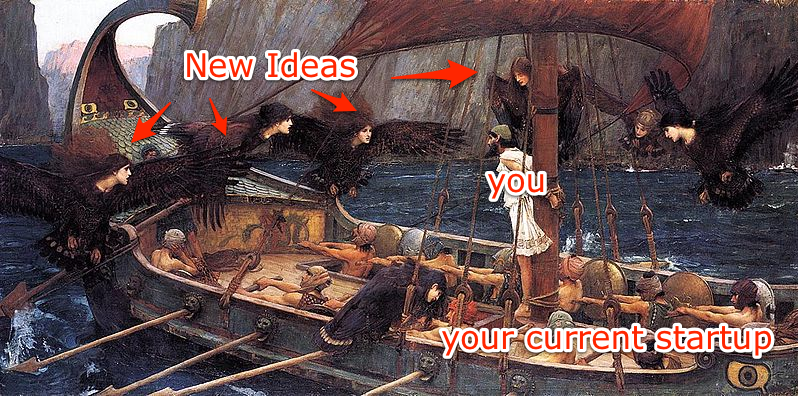Vinicius Vacanti is co-founder and CEO of Yipit. Next posts on how to acquire users for free and how to raise a Series A. Don’t miss them by subscribing via email or via twitter.
On my three year startup journey that lead to Yipit, I had over 30 other completely unrelated ideas. Each time I got the idea, I would immediately start sweating profusely for three straight hours in a ridiculous state of unbridled excitement and optimism. Sounds great, right? Not really. Those new ideas and the emotional frenzy were a serious distraction.
To be clear, the “ideas” I’m referring to are the ones that have nothing to do with your current startup. Switching your startup’s focus to a related area based on what you’ve learned (i.e. pivoting) is a winning strategy and one that Yipit employed twice. This post also assumes that you are and have been actively working on an idea. If you haven’t started yet, experimenting with new ideas is a great way to start.
In our case, Yipit had always been about organizing local information and we had been working on it for a while. But, along the way, we spent significant time on other unrelated ideas including:
- Social version of delicious (summer of 2007)
- Tool to recommend the best version of the online video you were currently watching (spring 2008)
- 140it.com: Bookmarklett that smartly shortens your tweet to less than 140 characters. Over 350K tweets shrunk (spring 2009)
- UnHub.com: 2-minute personal website creation using your existing third party profiles. 10K accounts, 40K monthly unique visitors (spring 2009)
I now think of these new ideas as the Sirens of the startup journey. If you listen to their call, your startup journey will cease to make progress. Each of these projects were serious distractions from our initial vision of organizing local information.
The Temptation
To understand why these new ideas can be so tempting, I refer you to the incredibly insightful startup transition cycle.

The gist is that when you have a new exciting idea, you are in a state of “uninformed optimism”. As you spend more time on the idea and start learning about all of the issues, you get into a state of “informed pessimism”. This is a bad state that eventually leads you to a “crisis of meaning” where you either turn the corner into “informed optimism” or crash and burn.
Most startups are in “informed pessimism” and heading to a “crisis of meaning”. And, that’s when the Sirens start calling with new exciting and unrelated ideas. Those new ideas are tempting because they are still in the “uninformed optimism” stage and seem so much better than your current idea. I fell for it several times.
The Danger
Your ability to become a successful entrepreneur is about taking your current “informed pessimism” idea and turning the corner into “informed optimism”. If every time you get to the disappointing “informed pessimism” stage, you impatiently hop back to a new idea at “uninformed optimism”, you’ll get caught in a never ending cycle. You have to be patient long enough with your idea to see if you are able to turn the corner.
The Solution
I finally learned to resist these new ideas after reading Tim Ferriss’s post. I now see those ideas for what they really are, “uninformed optimism” ideas. They may seem amazing but you just don’t know about all the issues associated with them.
So, if you are in the “informed pessimism” stage, either plug your ears or tie yourself to the masthead like Odysseus and keep working on your current idea. Don’t be seduced by the Siren call of that exciting but shallow unrelated idea.
Vinicius Vacanti is co-founder and CEO of Yipit. Next posts on how to acquire users for free and how to raise a Series A. Don’t miss them by subscribing via email or via twitter.







Pingback: Tweets that mention How New Ideas Almost Killed Our Startup | Vinicius Vacanti -- Topsy.com
Pingback: Startups and multiple choice questions
Pingback: TechZing » TechZing 59 – Jasonism
Pingback: My Friday’s Best Links « Absolute Beginner
Pingback: How to Pick a Great Co-Founder | Vinicius Vacanti